| Srl | Item |
| 1 |
ID:
101385
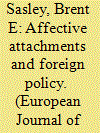

|
|
|
|
|
| Publication |
2010.
|
| Summary/Abstract |
Although the important role of emotions in decision-making has been highlighted in the psychology, neural science, and decision research literatures, this conclusion has not been widely adopted in foreign policy analysis and International Relations (IR). Of the work that has been done, much of it has been focused on public perceptions and the impact on foreign policy, but not on elites and the actual decisions of foreign policy. This article seeks to address this imbalance by examining the role of one element of emotion - affect - on key foreign policy decision-makers. It argues that the greater the emotional attachment a leader has to an object, the less flexible she is in foreign policy toward that object. The model is used to explain a critical puzzle in IR: Israel's decision to pursue and sign the 1993 Oslo Accords.
|
|
|
|
|
|
|
|
|
|
|
|
|
|
|
|
| 2 |
ID:
083681
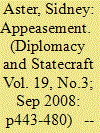

|
|
|
|
|
| Publication |
2008.
|
| Summary/Abstract |
Few of the enduring 'lessons of history' have had greater staying power than the legacy of appeasement. Decision-makers have used the crises of the 1930s to eschew and condemn appeasement. However, historians have not been so single minded in their analyses or applications. An historiographical survey of 'appeasement studies' then posits that a linear projection from orthodoxy, to revisionism, to counter- or post-revisionism' is not accurate. As to why recourse to the appeasement analogy is so prevalent is linked to the engagement, or lack thereof, between historians and public history and the decision-making process
|
|
|
|
|
|
|
|
|
|
|
|
|
|
|
|
| 3 |
ID:
176465


|
|
|
| 4 |
ID:
170774
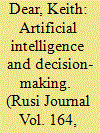

|
|
|
| 5 |
ID:
170778
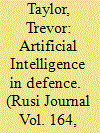

|
|
|
|
|
| Summary/Abstract |
here are multiple claims about the potential of artificial intelligence (AI)-enabled systems to boost or even transform defence capabilities. Trevor Taylor explores how the effective acquisition of such systems presents major challenges to governmental defence to act as an intelligent customer and to review the balance of capability generation responsibilities between government and private sector bodies. He also shows that the first step is to recognise how AI procurement does not fit in easily with established procurement elements, including requirements specification, competitive modes of procurement, speed of decision-making and test and acceptance arrangements.
|
|
|
|
|
|
|
|
|
|
|
|
|
|
|
|
| 6 |
ID:
141933


|
|
|
|
|
| Summary/Abstract |
The authors examine various techniques of assessing and considering the moral and psychological factor in decision-making by military unit commanders if automated troop control systems are involved.
|
|
|
|
|
|
|
|
|
|
|
|
|
|
|
|
| 7 |
ID:
131985
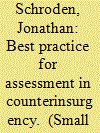

|
|
|
|
|
| Publication |
2014.
|
| Summary/Abstract |
In September 2011, the Commander of the International Security Assistance Force (ISAF) in Afghanistan directed the Afghan Assessment Group to redesign the way in which ISAF was assessing the status of the war, and to be 'revolutionary' in so doing. The resulting assessment paradigm was novel, non-doctrinal, and effectively addressed the unique complexities of the counterinsurgency in Afghanistan and the needs of the ISAF Commander. It had a two-tier structure consisting of both strategic and campaign assessments. The former focused on answering a set of strategic questions in narrative, analytic form to address the strategic environment, while the latter used a set of standards and accompanying narrative responses to gauge accomplishment of campaign tasks. Both tiers captured the current state of the war while maintaining an eye on future challenges and opportunities. The two assessments and their associated processes were designed to stimulate discussions leading directly to decisions by senior leaders on actions they could take, direct, or request. While any assessment paradigm will have advantages and disadvantages, an examination of the pros and cons of this assessment paradigm makes clear that it should be considered a 'best practice' in the field of counterinsurgency assessment.
|
|
|
|
|
|
|
|
|
|
|
|
|
|
|
|
| 8 |
ID:
184641
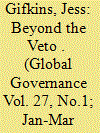

|
|
|
|
|
| Summary/Abstract |
The formal rules governing the UN Security Council offer little insight into how negotiations are conducted on a day-to-day basis. While it is generally assumed that permanent members dominate negotiations, this article investigates avenues for influence for elected members and the UN Secretariat. Institutional power is used to show how permanent members adopt dominant positions in negotiations extending far beyond their Charter-given privileges. Dominance of permanent members is moderated, however, by the legitimacy that support from elected members brings to a resolution. Similarly, the UN Secretariat can use its legitimated authority to influence decisions. The article argues that informal practices are key in understanding how power and influence are allocated in the Council and it forms a building block for future analyses of Security Council practices. This argument also has implications for the perennial reform debates and the prospects for informal reform.
|
|
|
|
|
|
|
|
|
|
|
|
|
|
|
|
| 9 |
ID:
180648
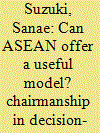

|
|
|
|
|
| Summary/Abstract |
ASEAN has adopted decision-making by consensus. Taking ASEAN as a case study, this article aims to explain how competing positions are reconciled and international agreements reached in organisations that have adopted consensus, a process that risks non-agreement because each participant has veto power, as their sole decision-making rule. ASEAN roundtables with the foreign ministers of its member states have indeed generated some meaningful agreements. I argue that rules and customs associated with ASEAN chairmanship effectively comprise a reconciliation mechanism. The chair is empowered to play an agenda-setting role, and the combination of rotating chairmanship and a limited number of member states means that every state will enjoy the strong power, within a reasonably short period of time. Since each state knows that its turn will come soon, all are willing to allow the others to exert the power of the chair and guide consensus toward agreements that are consistent with the chair’s national interests. This article analyses the impact of a strong ASEAN chair via empirical case studies of decisions reached (or not) under consensus regarding issues where member states had conflicting interests. This analysis of ASEAN decision-making contributes to the ongoing debate on effectiveness of ASEAN and has theoretical implications for the understanding of international organisations that operate under similar institutional settings.
|
|
|
|
|
|
|
|
|
|
|
|
|
|
|
|
| 10 |
ID:
124414


|
|
|
|
|
| Publication |
2013.
|
| Summary/Abstract |
This article analyzes the Government of Canada's decision to lobby the North Atlantic Treaty Organization (NATO) to lead the International Security Assistance Force (ISAF) in Afghanistan in 2003. Although studies have been conducted on Canada's choice to deploy to Kandahar province, the decision to lobby NATO, and the diplomatic efforts that resulted, have been given little attention. In addition, Ottawa's decision to propose joint leadership of the mission with Germany in 2003 warrants further study. This article considers three key motivations evident in the Canadian government's thinking-first, its view of deployment to Afghanistan as an alternative to deployment to Iraq; second, its interest in developing relations with Germany; and finally, its more general motivation to return to the conflict.
|
|
|
|
|
|
|
|
|
|
|
|
|
|
|
|
| 11 |
ID:
186065
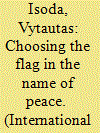

|
|
|
|
|
| Summary/Abstract |
The twenty-first century peacekeeping landscape is defined by the multiplicity of institutional frameworks under which international operations are deployed. Small states with limited resources cannot meet every demand for troop contributions and face the inevitable dilemma of choosing whose ‘flag’ to carry. For the first decade after joining NATO and the EU, the Baltic States gave a clear priority to NATO and U.S.-led military operations, but since the 2014 Ukrainian crisis gradually shifted their focus to the UN framework. Drawing on interviews with policy-makers in the three Baltic countries this article aims to explain this recent shift. It reviews the main theoretical assumptions about troop contributions to the UN peacekeeping operations and burden-sharing behaviour among NATO allies, and suggests that the recent troop deployment decisions of the Baltic States are best explained by a realist focus on national security concerns. The seemingly ‘internationalist’ context of UN peacekeeping operations simply happened to be most suitable for a bilateral exchange with their European allies, namely Germany and France, that in turn contributed troops to NATO's Baltic flank.
|
|
|
|
|
|
|
|
|
|
|
|
|
|
|
|
| 12 |
ID:
014318


|
|
|
|
|
| Publication |
Spring 1992.
|
| Description |
402-419
|
|
|
|
|
|
|
|
|
|
|
|
|
|
|
|
| 13 |
ID:
072323
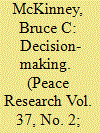

|
|
|
| 14 |
ID:
014290
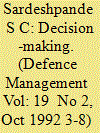

|
|
|
|
|
| Publication |
Oct 1992.
|
| Description |
3-8
|
|
|
|
|
|
|
|
|
|
|
|
|
|
|
|
| 15 |
ID:
168795


|
|
|
|
|
| Summary/Abstract |
Understanding how foreign policy decisions are made in revolutionary states has proven to be a difficult puzzle for scholars and practitioners alike. While political scientists have made great strides in developing standard decision-making frameworks, those have generally been based on the experiences and conditions of Western states and rely on stable government structures for their explanatory power. Revolutionary states by their very nature lack this stability, since the conditions of revolution commonly result in major reorganizations or wholesale removal of preexisting government structures. In this article, we begin to build a new framework for understanding decision-making in revolutionary states and employ case studies of Iran, Russia, Sudan, and Afghanistan to show that the process in these states involves input and considerations from various actors and therefore cannot be understood by simply looking at the desires of the charismatic leaders that are so often the focus of outside analysts.
|
|
|
|
|
|
|
|
|
|
|
|
|
|
|
|
| 16 |
ID:
148543
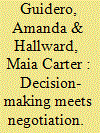

|
|
|
|
|
| Summary/Abstract |
The Israeli-Palestinian conflict attracts much scholarly and diplomatic attention. However, despite Secretary of State John Kerry’s determination during the 2014 round of negotiations, the parties are no closer to reaching a negotiated agreement over twenty years after the signing of the Oslo Accords. This article explores an under-examined aspect of negotiation, the decision to enter into talks, using poliheuristic theory. We examine the decision-making calculus of Palestinian president Mahmoud Abbas in his bid for Palestinian statehood at the United Nations, a decision to not negotiate. We ask not only why did Abbas choose to bypass US-mediated negotiations, but why he chose to pursue Palestinian statehood at the UN. In our analysis and discussion, we identify gaps in the existing decision-making and negotiation literatures and ways to better incorporate questions of power asymmetry and the complexity of context into poliheuristic theory.
|
|
|
|
|
|
|
|
|
|
|
|
|
|
|
|
| 17 |
ID:
016926
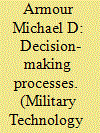

|
|
|
|
|
| Publication |
April 1994.
|
| Description |
70-74
|
|
|
|
|
|
|
|
|
|
|
|
|
|
|
|
| 18 |
ID:
012417


|
|
|
|
|
| Publication |
June 1996.
|
| Description |
133-53
|
|
|
|
|
|
|
|
|
|
|
|
|
|
|
|
| 19 |
ID:
183560


|
|
|
|
|
| Summary/Abstract |
The increasing diffusion of electric vehicles (EVs) can challenge the stability of distribution grids. Smart charging systems can reduce the stress of EV charging on the grid, but the potential of the technology depends on EV drivers' participation in smart charging schemes. To investigate this potential, we conducted an online randomised-controlled experiment with two waves (baseline and experimental phase, N = 222), in which we examined drivers' preferences for smart charging and tested a behavioral intervention to increase the number of smart charging choices. We translated state-of-charge (SoC) information from percentage of battery level into miles corresponding to the battery level and tailored information, i.e., the number of driving days covered by the actual SoC based on participants’ personal driving profiles. Participants preferred to use smart charging systems to decrease costs and to increase renewable energy use. However, they tended to overestimate the importance of the battery SoC when setting charging preferences. This overestimation was especially evident for participants who only drive short distances and may be lead to inefficient use of smart charging technology. Translating battery SoC into tailored information corrected for this bias and increased the number of smart charging choices. Our findings illustrate how behavioral interventions can be leveraged to attain energy transition goals.
|
|
|
|
|
|
|
|
|
|
|
|
|
|
|
|
| 20 |
ID:
185161
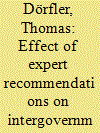

|
|
|
|
|
| Summary/Abstract |
The article explores whether and to what extent expert recommendations affect decision-making within the Security Council and its North Korea and Iran sanctions regimes. The article first develops a rationalist theoretical argument to show why making many second-stage decisions, such as determining lists of items under export restrictions, subjects Security Council members to repeating coordination situations. Expert recommendations may provide focal point solutions to coordination problems, even when interests diverge and preferences remain stable. Empirically, the article first explores whether expert recommendations affected decision-making on commodity sanctions imposed on North Korea. Council members heavily relied on recommended export trigger lists as focal points, solving a divisive conflict among great powers. Second, the article explores whether expert recommendations affected the designation of sanctions violators in the Iran sanctions regime. Council members designated individuals and entities following expert recommendations as focal points, despite conflicting interests among great powers. The article concludes that expert recommendations are an additional means of influence in Security Council decision-making and seem relevant for second-stage decision-making among great powers in other international organisations.
|
|
|
|
|
|
|
|
|
|
|
|
|
|
|
|